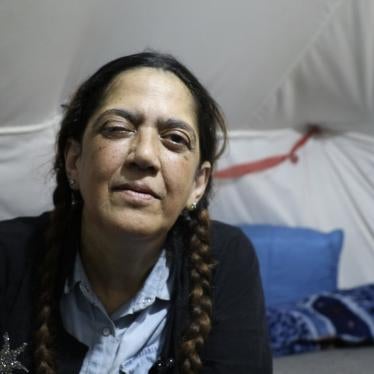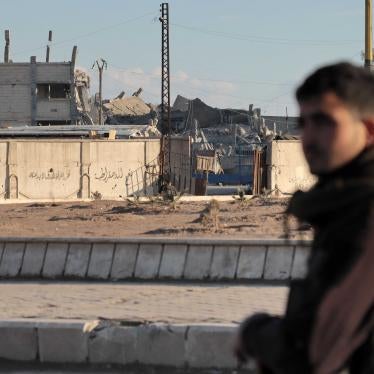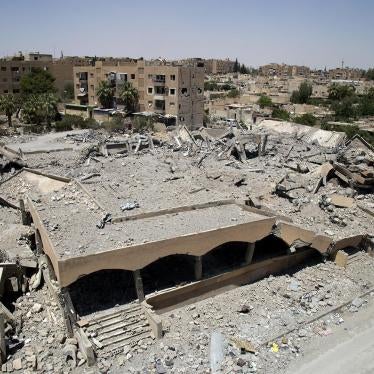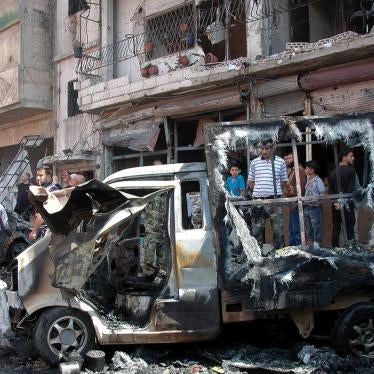Baghdad — One morning in January, two armed men entered the shop of a Christian metalworker, Laith Hadi Bahnam, in the Karama industrial zone of Mosul, and demanded that he repair a silencer for one of their guns. When Bahnam refused, according to two of his friends, one of the gunmen threatened, "I'm going to kill you."
Ten days later, on January 29, the two armed men returned. As Bahnam, 56, pleaded for his life, the gunmen shot him three times in the face and chest, killing him instantly. Local authorities attributed the killing to the group calling itself the Islamic State of Iraq and al-Sham, or ISIS. But although there were many witnesses, the authorities did not investigate further and made no arrests.
This week, ISIS brazenly seized Mosul from Iraq's U.S.-supported military, catching both Baghdad and Washington off guard. But the capture of Iraq's second-largest city should not have come as a surprise. Long before the city's dramatic fall, ISIS, which formed in April 2013, and its precursor, al Qaeda in Iraq, were operating openly for years in Mosul, killing civilians like Bahnam with impunity, manipulating the justice system, and even collecting so-called "jihad taxes" from local businesses. And yet Iraq's extensive military and security apparatus did almost nothing.
I visited Iraq in May, in part to investigate recent ISIS abuses in Mosul. I met with and interviewed Mosul residents in the capital, Baghdad, and in Erbil, the capital of Iraqi Kurdistan (it was too dangerous for them to speak with me in their hometown). From their stories, I got a horrifying glimpse of what may be in store if the group achieves its goal of establishing a "caliphate" in the region.
In the past nine months, for example, ISIS killed four Mosul journalists and wounded more than a dozen others. One of the wounded, a cameraman with al-Mosuliya TV, lost one leg and use of the other after ISIS placed a bomb in his car. Al-Mosuliya is considered pro-government, but the cameraman, Salah Nazal, a 41-year-old father of four, told me he didn't know if that is why he was attacked. "All journalists in Mosul are targets," he said.
In April and May, ISIS summarily executed two Mosul judges who investigated terrorism cases, two of the judges' friends told me. One was gunned down as he left a local mosque. The other was shot in the head outside his home, in front of his wife and young son. No arrests have been made in connection with the killings.
ISIS also levies a "jihad tax" on most Mosul businesses, local residents told me, including state-run cement companies, cellphone firms, doctor's offices, parking garages, and farmers markets. One merchant described how his shop was bombed when he tried to evade making a payment. Other residents described ISIS kidnapping friends and relatives for ransom.
"In Mosul, the armed groups function as a shadow state," said one journalist from Mosul who investigates ISIS. "They have their own institutions, each with workers under their command. These aren't just fighters. They include accountants, clerks, men with high degrees, and, of course, spies."
The residents I spoke with included politicians, lawyers, businessmen, and victims' relatives. Nearly all of them did not want their names published, fearing reprisal from ISIS or local state security forces, which they suspected in some cases of colluding with armed militant groups. They included Christians, Shiites, and Sunnis. All said they were horrified that ISIS claimed to be acting in the name of organized religion, but that they were equally horrified by the inability or unwillingness of Iraqi authorities to rein in ISIS.
The "jihad tax" collectors, for example, operate in broad daylight, arriving at homes and businesses unmasked, often carrying briefcases filled with files on each payee's profit margins. Yet they are not arrested.
"Everyone knows who they are; they make no effort to hide," said Muhammad, a 45-year-old appliance shop owner. Muhammad said he was paying ISIS the equivalent of $200 a month, about 10 percent of his income, as involuntary "protection" and as well as a donation to the caliphate cause. "Sometimes they even sit and drink tea and have lunch when they come to collect their money." Some local officials were too scared to take action, but in other cases they appeared to be working with ISIS and other armed groups, Muhammad and other residents said.
One lawyer from Mosul said that when local police did make arrests, they often falsely accused people who then had to pay bribes to be freed, or released their prisoners in the face of ISIS intimidation. "Even if the authorities sometimes catch the killer, after two or three days, they let them go," the lawyer said. The pressure was not subtle. ISIS members, he noted, would stride directly into the courthouse and threaten judges.
The security forces also showed signs of not just corruption or intimidation, but sheer incompetence. Two journalists described surviving an ISIS attack on a media bus that the Iraqi military was using to transport reporters to polling sites two days before the April 30 parliamentary elections. The attack, from an improvised explosive device, wounded six journalists, one of them seriously, but would have left all passengers unscathed had the bus been armored, they said.
"When we first saw the bus we complained to the military, saying, 'It's too dangerous to travel in an unarmored vehicle -- we might get attacked,'" one journalist said. "The colonel in charge just told us not to worry. The bus was attacked 30 meters from a military checkpoint. What kind of security is that?"
If the capture of Mosul by ISIS exposes the failings of Iraqi security forces, it also highlights the broader failings of U.S. policy in Iraq. Washington has doled out more than $20 billion in military aid to Baghdad since the U.S. invasion in 2003, including ammunition, Hellfire missiles, and surveillance drones. But the Obama administration has remained shockingly silent on Iraqi forces' repeated abuses against civilians, such as unlawful raids and arrests, torture, and largely indiscriminate shelling and barrel-bombing in the city of Fallujah and other parts of the largely Sunni-populated Anbar province. Sunni civilians, who have been marginalized by Nouri al-Maliki's Shiite-dominated government, have borne the brunt of these attacks, including in Mosul.
In response to Mosul's fall, Washington is reportedly mulling whether to ramp up arms shipments to Iraq. If so, the Obama administration and its allies need to ensure that any military support is not used to commit further human rights abuses. They also need to press Maliki harder on providing genuine political participation to disenfranchised Sunnis and other minorities -- a move that is critical to quelling support for ISIS.
The perils of funneling arms and ammunition to the Iraqi military without these reforms are clear from the failed six-month military campaign to rout ISIS from Fallujah. A number of Sunni sheikhs in Anbar, the birthplace of the "Awakening Councils" -- U.S.-funded militias drawn largely from the ranks of Sunni Muslims -- have told Human Rights Watch they would love to show ISIS insurgents the door, as they did once already, in 2007. But in the meantime their militias are fighting alongside ISIS because they have even greater hatred for Maliki, who reneged on promises to compensate and bring Awakening Council members into the military and instead had many arrested or killed.
Maliki's government also needs to prosecute all those responsible for major abuses, regardless of which side they are on. For the families of victims like the Mosul metalworker Laith Hadi Bahnam, who lost his life defying ISIS, that might be the most meaningful act of all.









